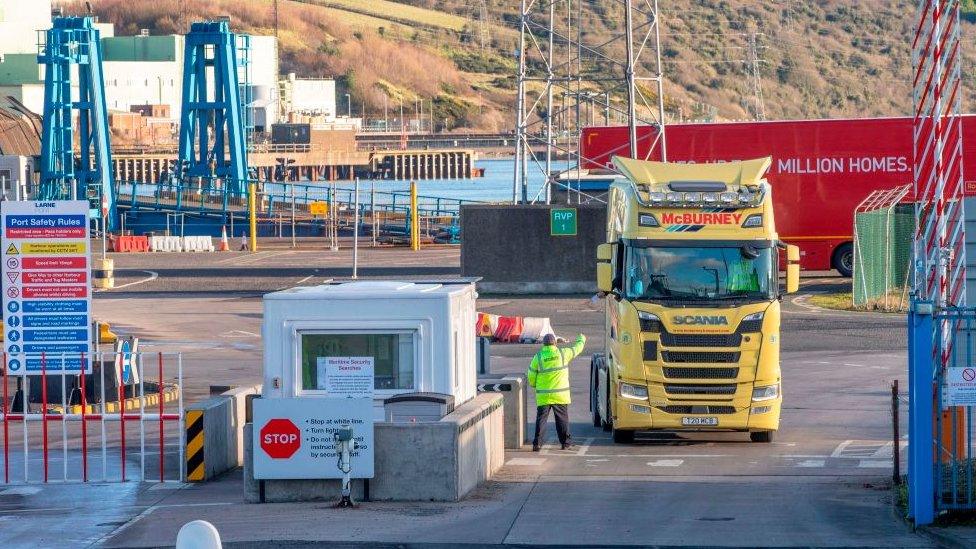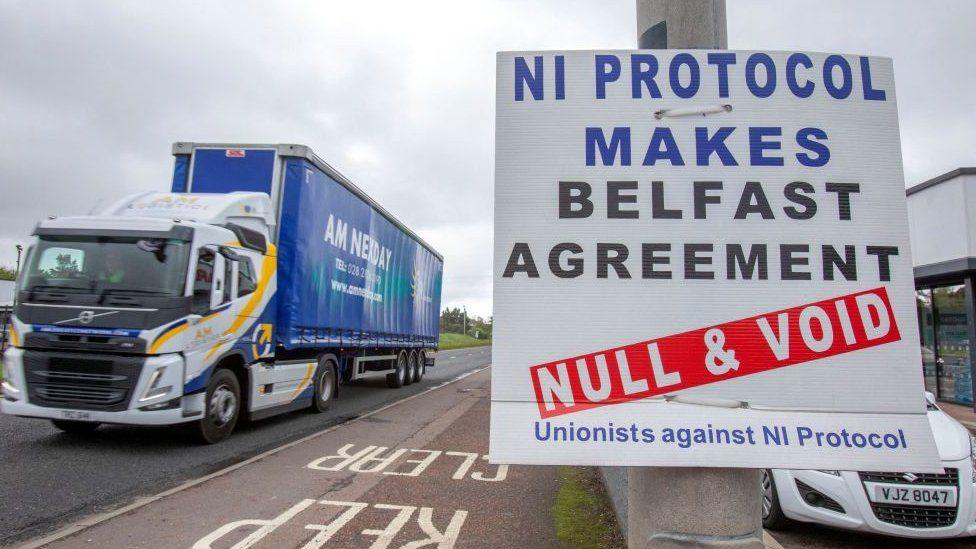Northern Ireland Protocol: UK on 'cusp' of new Brexit deal, says Dominic Raab
- Published
Watch: We've made progress on Northern Ireland Brexit deal - Raab
The UK "is on the cusp" of securing a new Brexit deal on Northern Ireland, the deputy prime minister has said.
Dominic Raab told the BBC the government had made "great progress" negotiating with the European Union.
The UK wants to change the Northern Ireland Protocol, an agreement with the EU which sees certain goods checked when entering from the rest of the UK.
Prime Minister Rishi Sunak said he was giving the negotiations "everything" in an attempt to clinch a deal.
Speaking on BBC Sunday with Laura Kuenssberg, Mr Raab said: "We're on the cusp, we've made great progress, we're not there yet, but it would be a really important deal...
"I think it would mark a paradigm shift first and foremost for the communities in Northern Ireland, but I think it would be a significant achievement."
The Democratic Unionist Party (DUP) has complained about what it calls a "democratic deficit" with Northern Ireland being subject to EU rules while not having a say on them.
Mr Raab said the EU had "moved" on some issues, saying: "If there are any new rules that would apply in relation to Northern Ireland, it must be right that there is a Northern Irish democratic check on that."
The protocol, signed by Boris Johnson in 2020, sees Northern Ireland continue to follow some EU laws so that goods can flow freely over the border to the Irish Republic without checks.
The DUP believes the protocol undermines the nation's position within the rest of the UK as well as having an adverse impact on trade flow.
The party has prevented a Northern Ireland devolved government from forming - leaving it in political gridlock.
Mr Raab said the UK wants to see a move away from checks on every consignment of goods coming into Northern Ireland from the rest of the UK. The EU is worried about goods posing a threat to the single market by moving between Northern Ireland and the EU.
He suggested an "intelligence-based" rather than "tick box" approach for goods - "which effectively means, they look at what is happening in the Republic with goods that go to Northern Ireland in case there's a risk of them going into the wider single market - and if we can achieve that, it will be a massive win."

What is the Northern Ireland Protocol?
The Northern Ireland Protocol is a trading arrangement, negotiated during Brexit talks. It allows goods to be transported across the Irish land border without the need for checks.
Before Brexit, it was easy to transport goods across this border because both sides followed the same EU rules. After the UK left, special trading arrangements were needed because Northern Ireland has a land border with the Republic of Ireland, which is part of the EU.
The EU has strict food rules and requires border checks when certain goods - such as milk and eggs - arrive from non-EU countries.
The land border is a sensitive issue because of Northern Ireland's troubled political history. It was feared that cameras or border posts - as part of these checks - could lead to instability.
The UK and the EU agreed that protecting the Northern Ireland peace deal - the Good Friday agreement - was an absolute priority.
So, both sides signed the Northern Ireland Protocol as part of the Brexit withdrawal agreement.
It is now part of international law.

Rishi Sunak said on Saturday his government was "giving it everything we've got" to finalise a deal to fix issues with the protocol.
But he has been warned by Eurosceptic Conservative MPs not to rush into calling a vote in Parliament on the new agreement.
Asked if MPs would get to vote on any new deal, Mr Raab said: "Parliament will have its ability to express itself."
Mark Francois, who heads the European Research Group of Eurosceptic Tory MPs, warned Mr Sunak it would be "incredibly unwise" to bring in any new deal without giving MPs a vote.
He told Sky News: "Don't try to bounce Parliament next week because that is likely to go badly wrong.
"So, if they've got a deal they're proud of, show us the text. Let us run it by our lawyers. Let us fully understand what it means. Then, at that point, we might be ready to vote on it."
He added that EU law needed to be "expunged" from Northern Ireland, bringing it in line with England, Scotland and Wales.
But former Prime Minister John Major urged Conservative and DUP MPs to not let concerns over the European Court of Justice get in the way of easing trade and restoring the devolved government in Northern Ireland.
He told BBC Radio 4 Westminster Hour: "Their involvement would be tiny... occasional involvement of the ECJ really ought not to stop an agreement being made.
"They talk of democracy. Democracy is thrown away when that [Northern Ireland] Assembly is not sitting. We need them back."
Speaking on Sunday with Laura Kuenssberg, Labour's shadow foreign secretary David Lammy said his party would vote for a new deal in the national interest of the UK and restoring Northern Ireland's Assembly.
"Our judgement is that any deal that emerges will be better than what we've got now," he said.
On Saturday, Irish Prime Minister Leo Varadkar also said the deal was "inching towards a conclusion", and urged the EU and the UK to "go the extra mile" to close the deal.


Related topics
- Published25 February 2023

- Published8 February 2023

- Published24 February 2023